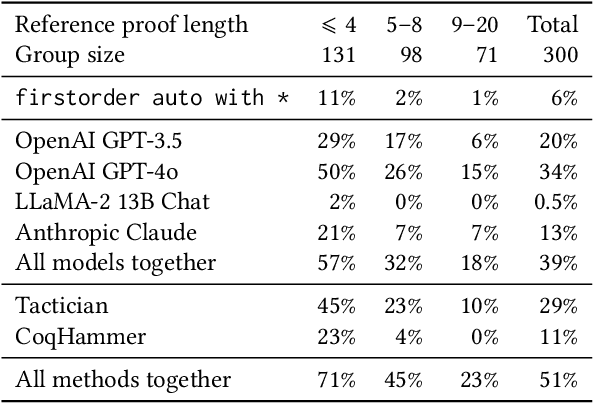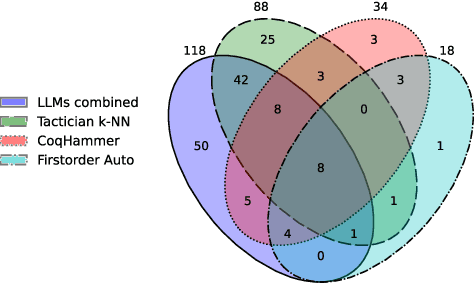Gleb Solovev
RocqSmith: Can Automatic Optimization Forge Better Proof Agents?
Feb 05, 2026Abstract:This work studies the applicability of automatic AI agent optimization methods to real-world agents in formal verification settings, focusing on automated theorem proving in Rocq as a representative and challenging domain. We evaluate how different automatic agent optimizers perform when applied to the task of optimizing a Rocq proof-generation agent, and assess whether parts of the fine-grained tuning of agentic systems, such as prompt design, contextual knowledge, and control strategies, can be automated. Our results show that while several optimizers yield measurable improvements, simple few-shot bootstrapping is the most consistently effective; however, none of the studied methods matches the performance of a carefully engineered state-of-the-art proof agent.
RocqStar: Leveraging Similarity-driven Retrieval and Agentic Systems for Rocq generation
May 28, 2025Abstract:Interactive Theorem Proving was repeatedly shown to be fruitful combined with Generative Artificial Intelligence. This paper assesses multiple approaches to Rocq generation and illuminates potential avenues for improvement. We highlight the importance of thorough premise selection for generating Rocq proofs and propose a novel approach, leveraging retrieval via a self-attentive embedder model. The evaluation of the designed approach shows up to 28% relative increase of the generator's performance. We tackle the problem of writing Rocq proofs using a multi-stage agentic system, tailored for formal verification, and demonstrate its high effectiveness. We conduct an ablation study and show the use of multi-agent debate on the planning stage of proof synthesis.
CoqPilot, a plugin for LLM-based generation of proofs
Oct 25, 2024

Abstract:We present CoqPilot, a VS Code extension designed to help automate writing of Coq proofs. The plugin collects the parts of proofs marked with the admit tactic in a Coq file, i.e., proof holes, and combines LLMs along with non-machine-learning methods to generate proof candidates for the holes. Then, CoqPilot checks if each proof candidate solves the given subgoal and, if successful, replaces the hole with it. The focus of CoqPilot is twofold. Firstly, we want to allow users to seamlessly combine multiple Coq generation approaches and provide a zero-setup experience for our tool. Secondly, we want to deliver a platform for LLM-based experiments on Coq proof generation. We developed a benchmarking system for Coq generation methods, available in the plugin, and conducted an experiment using it, showcasing the framework's possibilities. Demo of CoqPilot is available at: https://youtu.be/oB1Lx-So9Lo. Code at: https://github.com/JetBrains-Research/coqpilot
Hybrid Generative AI for De Novo Design of Co-Crystals with Enhanced Tabletability
Oct 22, 2024Abstract:Co-crystallization is an accessible way to control physicochemical characteristics of organic crystals, which finds many biomedical applications. In this work, we present Generative Method for Co-crystal Design (GEMCODE), a novel pipeline for automated co-crystal screening based on the hybridization of deep generative models and evolutionary optimization for broader exploration of the target chemical space. GEMCODE enables fast de novo co-crystal design with target tabletability profiles, which is crucial for the development of pharmaceuticals. With a series of experimental studies highlighting validation and discovery cases, we show that GEMCODE is effective even under realistic computational constraints. Furthermore, we explore the potential of language models in generating co-crystals. Finally, we present numerous previously unknown co-crystals predicted by GEMCODE and discuss its potential in accelerating drug development.
 Add to Chrome
Add to Chrome Add to Firefox
Add to Firefox Add to Edge
Add to Edge